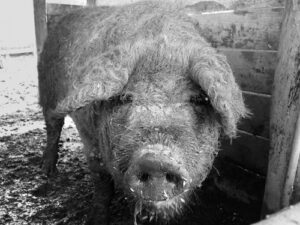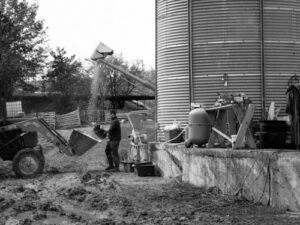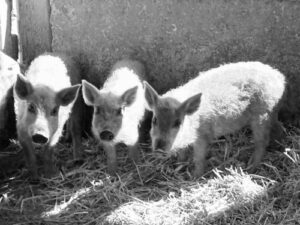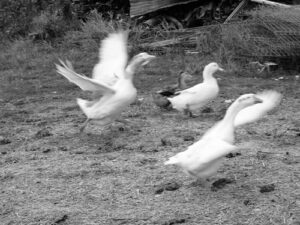We met Mr. Kovács at a parking space because the road from there to his farm was only passable for a 4WD. Having entered his car, he drove us up a hillside, sometimes feeling that we were moving more sideways than straight ahead. Having arrived at his farm, we could see a haphazard collection of fences, enclosures, buildings, a silo where a man was working and lots of mud. Fortunately, he gave me some simple plastic covers for my shoes, else I couldn’t have entered his farm.
Mr. Kovács has one assistant, a man who has grown up on a farm and is used to handling animals.
Mr. Kovács has about 350 pigs and 500-600 poultry consisting of hens, chickens, guinea fowls, geese and pheasants. He was raising mangalitsa pigs as a hobby for 15 years, then it turned into a full-time job since he likes working with animals and being in nature.
He’s running an organic farm cultivating organic cereals for pigs and he got an official license in 2021. There are only 3 certified breeders in Romania since there are very strict requirements for pig farmers, and he had to build a wall down to solid ground around his farm.
When he wanted to start his farm, people from the nearby village had made an illegal garbage dump which had to be cleared first, and he had to remove 50 trucks of garbage. Next, he hired a company to find water which was located at 89 m depth.
All the pigs are living inside a pen with an electric fence to keep them inside and bears outside. They must be inside the enclosure because they can be dangerous to people. Besides, bears can attack the pigs. They are free to walk where they want inside the enclosure, parts of it being turned into muddy fields by the pigs.
The piglets were kept for themselves in a shed.
There is a 180-year bloodline of the mangalitsa pigs, no artificial insemination is done, instead letting the pigs breed by themselves. The farmer shouted for the pigs to arrive, but only the small ones came, while the big ones were satisfied with eating acorns somewhere else.
In hot summers, the pigs prefer to stay in mud baths.
A meat processing unit, where mostly mangalitsa pigs and game meat is used to make cold cuts, is located in the city of Sepsiszentgyörgy/Sfântu Gheorghe a short distance away.
Some male pigs are castrated when they are 2-3 months old, and they will be slaughtered when they are 24-28 months old, while the rest are used for breeding.
Some hens and other poultry were inside fences, while a group of geese were wandering aimlessly wherever they wanted.
I have visited another man, Mr. Sándor Huba , who is also raising mangalitsa pigs.




